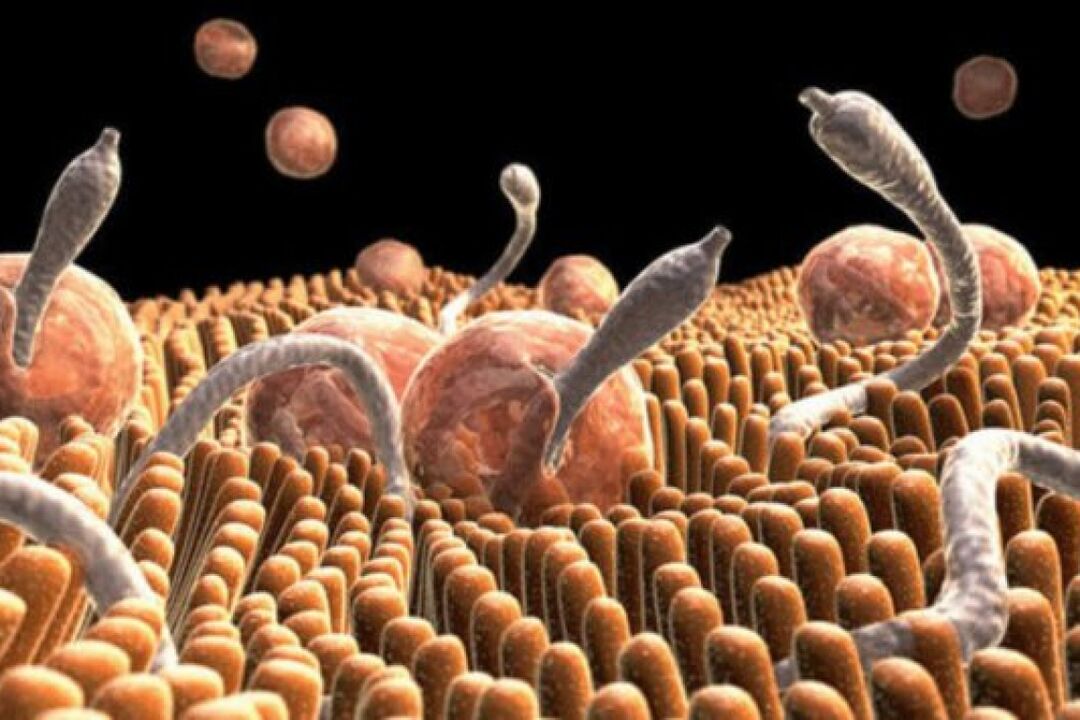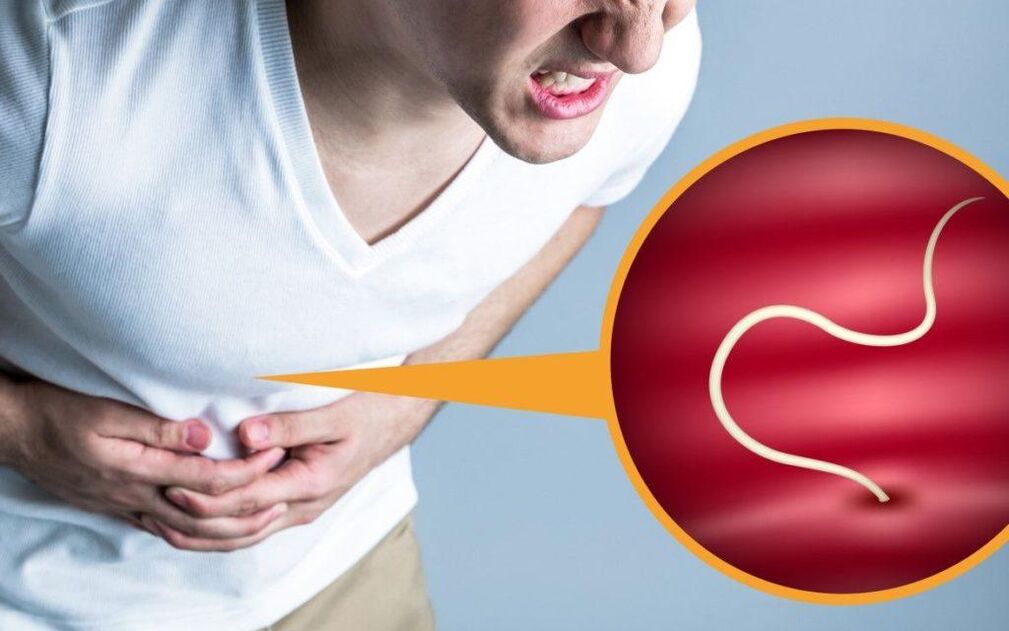
The parasites in the human body come from the environment and perform vigorous activities there. The toxic substances formed due to the activities of these organisms can poison the human body and cause serious damage to health. Symptoms of parasites entering the body can be various unpleasant signs that require emergency treatment. If the treatment of the invasion is started in time, the consequences of the disease will be minimized.
What are the parasites in the human body
Parasites in the human body ensure their existence at the expense of the host. Parasites live in the human body and perform important activities. They feed on human food and energy, and usually feed on human cells and tissues. Recent studies have shown that the probability of the presence of parasites in any organism is 85%. Some scientists have increased this figure by another 10%.

Dr. Ross Andersen issued a statement stating that parasitic infection is the most undiagnosed disease in the world. He admits that this is a very bold statement, but it is based on data analysis of the medical history data of more than 20, 000 patients and more than 20 years of work experience.
By analyzing the stool samples, it can be determined that the parasites are indeed present in the human body. This is the traditional and most common diagnostic method. However, it has very little information and is unreliable, because only a laboratory assistant can detect the parasite by observing the parasite through a microscope.
Parasites in the human body can live almost anywhere. They have no obstacles. They not only live in the intestine, but also live in the liver, joints and muscles, blood, brain and eyes. Science knows that there are more than 100 kinds of parasites living in the human body, from invisible amoebas to worms several meters long.
But after all, worms do not always lay a large number of eggs, which means that parasites may not be detected in standard studies. Some experts recommend three tests, but this does not guarantee reliable results. It is believed that in order to detect parasites, at least 8 or even 10 stool studies are required.
At the same time, it was found that the most common parasites in the human intestines are worms. They all have different shapes. They look like a leaf of wood, like a woman's bracelet, and like a pencil with sharpened sides.

However, they have one thing in common-their goal is to destroy their master and extract the greatest benefit from his body. In addition, all parasites are highly productive and viable.
It is wrong to think that worm invasion is just a childhood disease. Adults are often affected by them, and most people do not even doubt such an unpleasant and dangerous community.
Types of human parasites
Parasites in the human body. After being infected with any kind of parasitic microorganism, a person may not even realize the trouble. Only a few symptoms can indicate the presence of pathogenic organisms: general malaise, weight gain or loss.
Only when the number of microorganisms reaches a large value and the systemic and local immunity is significantly reduced will the signs of physical invasion appear. Many types of worms are characterized by their great harm to human health.
Types of human parasites:
- roundworms:The size is microscopic. The most famous representatives of this group are Trichinella, roundworm, pinworm, and whipworm;
- fluke:Group flatworms. They are parasitic inside and outside the body. These include species of flukes and flukes;
- will:Tapeworms, tapeworms, tapeworms, are tapeworms. They have no digestive system;
- Spiny: These are worms, small in size, flat and slender, and covered with thorns;
- With scraper:A person is infected by an infected fish, bird, or mammal. Microorganisms that live under the skin. These include round worms of risht. It is also called the guinea worm. The risk of intrusion is very high;
- amoeba: Single-cell microscopic worms. It has an irregular, constantly changing shape. Deposited in blood vessels, it will cause heart and vascular system diseases, stroke development. Is the causative agent of amebiasis;
The liver is affected by different types of lamella, amoeba, schistosome, roundworm, and hydatid, which can cause obstacles to many processes in the body. The liver and other organs have no defense against a large group of toxic microorganisms.
Ways of parasites invading the human body
Parasites in the human body. Parasitic diseases and worm infections are caused by pathogens that enter the human body in many ways. In most cases, infection occurs when worms (parasites) enter the mouth through dirty hands (food and water are contaminated with soil, eggs, and pathogen cysts).
Insects (flies, cockroaches), rodents and large animals (cats, dogs) can spread the pathogens of parasitic infections and protozoal diseases through infected household items.
Parasitic pathogens and their larvae can live in almost all organs and tissues-in the large and small intestine, rectum, biliary and urinary tract, bronchopulmonary system, blood, brain and liver tissue, muscle tissue and eyes. . .
In children's groups, worm eggs are spread through toys and dirty hands. Some parasites can enter the host's body through skin (even intact) and mucous membrane contact, and rarely enter the host's body through inhalation.
In the course of evolution, many parasites have formed special transmission mechanisms in order to preserve their species (for example, a complex development cycle, changes in the host, formation of cysts and protective membranes).
The parasite has lost some organs (vision, digestive system). But at the same time, the parasite's reproductive system has reached an amazing development (hermaphrodite, a person secretes a large number of eggs).
Diagnosis of parasitic diseases
Parasites in the human body. An important issue is the diagnosis and detection of parasites for timely treatment and removal from the body. The diagnosis and identification of many types of helminthiasis is based on the detection of parasites, eggs in feces, and the use of other technologies.

Often, repeated inspections of the stool are required to confirm a reliable diagnosis of parasitic diseases. For enterobiasis, research was conducted by scraping the parasite's eggs from the perianal folds.
ELISA (enzyme-linked immunosorbent assay) allows you to identify pathogens by checking antibodies in the blood. A general analysis of all parasitic diseases and worm invasions shows an increase in the proportion of eosinophils in the blood, which indicates an allergy, usually a sign of iron deficiency or other causes of anemia (large cells, B12 deficiency).
The long-term large-scale invasion of parasites can cause electrolyte changes and lack of minerals (calcium and phosphorus). When helminthiasis is suspected, biochemical tests of liver damage markers, transaminase, and bilirubin are usually used.
Ultrasound, gastric and duodenal endoscopy, CT-examination-can be used to diagnose certain parasitic diseases (hydatid disease, giardiasis). For trichinosis, muscle tissue and skin must be biopsied (to detect parasites and confirm the diagnosis).
Symptoms of parasites in the human body
Parasites in the human body are organisms that rely on their hosts to survive. They live parallel lives within us, feeding on our energy, cells, and food. It is no secret that they throw waste directly into our bodies and die there.
The symptoms of parasites in the human body are diverse. The insidious thing about them is that they all behave in a way that is almost impossible to diagnose instantly. Regardless of whether a person has worms or not, the symptoms of any helminthiasis are very similar.
In addition, there are symptoms of lack of any kind of nutrient, because it is well known that parasites absorb the most useful nutrients from food, including vitamins and minerals.
Symptoms of parasites in the human body:
- Persistent fatigue, decreased performance, nervousness, irritability;
- Drowsiness, or conversely, insomnia;
- Problem skin and hair;
- Layered nails, cracked heels, various spots on the skin, cosmetic defects in the form of early facial wrinkles;
- Abdominal pain, flatulence (gas and bloating);
- Stool disorders (the more common form is diarrhea, but constipation may also occur);
- Significant changes in body weight in a relatively short period of time;
- Bulimia (long-term increase in appetite) or, conversely, decreased appetite;
- Vitamin deficiency (vitamin deficiency);
- Anemia, low hemoglobin; Granuloma, tumor;
- Headache, joint pain, muscle pain;
- Grinding teeth while sleeping, anal itching;
- Immune disorders, frequent colds;
- The frequency of allergic reactions in the form of asthma, atopic dermatitis, and urticaria increases.
Symptoms of human liver parasites
The parasites in the liver may be silent for a long time. It is important for patients to pay attention to the signs and symptoms that indicate the presence of parasites in time.
In most cases, the parasites in the liver will have the following symptoms:
- Weight loss, fever, leukocytosis, right side pain (or discomfort). Sometimes the pain radiates to the shoulder. This clinical manifestation is a typical hepatic amebiasis; the organic and functional changes of the liver usually occur together with giardiasis;
- Tension and excitement. This is one of the most common symptoms of parasitic infection, not only the liver, but the entire body. Parasite waste has a toxic effect on the human nervous system. According to medical observations, after removing the parasites, the patient became more patient and calm;
- sleep disorder. The peak of liver activity occurs at 2-3 in the morning. In the presence of parasites, patients will wake up at this time almost every night. Sometimes the worms are excreted through the anus, which can also cause sleep interruptions in the patient;
- Other symptoms associated with parasite liver infections include: bad breath and bad breath, persistent hunger, pimples and pimples, diabetes, headaches and migraines.
Treatment of parasites in the human body
Drug treatment of parasites in human body
The designation and control of drug treatment are entirely carried out by infectious disease specialists or parasitologists. In addition to the successful treatment of parasitic diseases with drugs, alternative medicine methods have also been used.
For the drug treatment of helminthiasis, they widely use well-known and the latest anti-helminth drugs.
Use folk methods to treat parasites in the human body
Parasites in the human body. It takes less than a day to get rid of parasites in the human body with folk remedies.

If the method is strong, the worm will die on the first day. But there are some eggs that cannot be processed for the first time.
How to get rid of parasites in the home-recipe:
- Clear sauerkraut brine from the body will be effective: drink ½ cup 3 times a day. Before meals. He can eliminate parasites in the liver;
- Even flowers can heal a person: fill a bottle with lavender inflorescences and pour vodka over the mouth of the bottle. Let stand for 10 days and take 1 teaspoon. Before each meal. Comments on this popular method are commendable.
- You can use mushrooms to remove parasites from adults: for this, use tinctures obtained at home. Mushrooms and chanterelles are effective against worms. Insist on adding a cup of chopped mushrooms to 0. 5 liters of vodka for 14 days. Drink 1 tablespoon. Lake 3 r. /d. Before eating. To make cleaning more effective, drink the product with calendula, gooseberry and yarrow. Treatment lasts for one month;
- Allow folk remedies to be used in recipes for parasites in plant seeds: it is best to use flour to remove cumin and dill seeds. The mixture is consumed within 1 teaspoon. And rinse with water. In this way, long-term (6 months) removal of parasites, but not without results.
The effect of parasites on the body
Parasites in the human body destroy the function of organs, cause inflammation processes in them, and destroy tissues. Usually in the course of its life activities, the parasite will produce substances that are toxic to humans, which will cause his body to gradually become poisoned.
Parasites in the intestine use nutrients in food for growth and development. Therefore, the human body begins to lack them. This is especially dangerous for children because their growth rate slows down and their physical and mental development is impaired.
Parasites are well adapted and able to live in an organism for many years, and their eggs and larvae are highly resistant to the environment.
In the digestive organs, in order to protect them, parasites can secrete special substances to inactivate enzymes and disrupt the food digestion process. Therefore, patients with parasites in the intestines often have symptoms similar to digestive diseases.
Does a person need to get rid of parasites in the body?
As for purifying organisms from parasites, it does not make sense to do it just because it has become fashionable and popular. If a person does not have any symptoms of invasion, but observes indigestion regularly, then it is best to simply switch to a milder diet and adjust your lifestyle.

Nature itself has designated the human intestine as a "safe haven" for bacteria. Without them, a person would simply not exist. Even dangerous microorganisms such as Staphylococcus aureus and Candida are needed by humans because they participate in the food chain and are food for beneficial bacteria.
If a person is healthy, then his body is like a well-coordinated system, and nothing will interfere with its operation. A strong immune system will prevent any parasites from harming the body.
However, under the background of weakened self-defense ability, the diet is unreasonable. Due to the intake of drugs, the work of the internal ecosystem of the body is disturbed, and parasites can enter and cause harm. In this case, you should get rid of them by all available means. Not only need to clean the liver, but also the entire body.




























